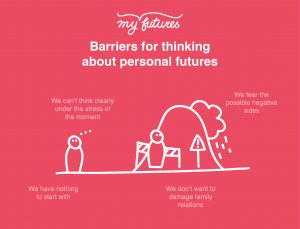
In our lives, thinking about and acting towards the future is sometimes needed but not always easy. There can be many reasons why we find it hard to think about our possible personal futures. We call these reasons Barriers.
Barrier 1: [wc_highlight color=”red” class=””]Stressful situations [/wc_highlight]
When we find ourselves in an urgent or stressful situation there is little room to think far ahead about our future needs and wishes. We then have eyes only for the most pressing immediate needs.
Example from: Personal Care Budget planning
At the moment of planning professional care with a personal budget people make decisions for an entire year to come. It seems obvious to look ahead, at least one year, at this point. But in reality people experience a lot of stress and are mostly concerned with arranging urgent immediate care for a loved one. In this situation they don’t consider possible needs and wishes of themselves or their loved ones in the near future.
“Looking back, everybody was exhausted but we didn’t tell each other at that time.” – Agnes
Literature
This barrier is known in literature as the Scarcity Theory. Mullainathan and Shafir (2013) describe the phenomenon that people who experience scarcity, for example, little time or money, behave differently from people who have enough. They need their capacities to solve urgent issues and therefore have difficulties making wise decisions for the long term. This leads to new urgent problems in the future and the same limitations causing and endless cycle.
Reference: Mullainathan, S., & Shafir, E. (2013). Scarcity: Why having too little means so much.

Barrier 2: [wc_highlight color=”red” class=””]No trigger [/wc_highlight]
We might feel the urge to think about the future but without a trigger it is difficult to start.
Example from: Family conversations
In our society nowadays, we are expected to live our old age at home as long as possible and to arrange care through our own networks when needed. People who might care for us in the future are often close family. But when do we ever have a conversation with them about our ideas and expectations regarding housing and care in the future? We procrastinate. A timely conversation about ageing, living and care in the future always feels ‘too soon’ until it is ‘too late’.
“You think: ‘We’ll do it with Christmas or when it’s raining.’ But in the end we’re always too busy doing other things.” – Jos
Literature
Even people who capable of doing something that they really want have difficulties to start without an external trigger. Fogg (2009) describes human behaviour as the product of three factors: Motivation, ability and triggers.
Reference: Fogg, B. J. (2009, April). A behavior model for persuasive design. In Proceedings of the 4th international Conference on Persuasive Technology

Barrier 3: [wc_highlight color=”red” class=””]Damage relationships [/wc_highlight]
Barrier: We fear that talking about possible changes in the future might damage family relationships.
Example from: Family conversations
Family relationships, roles, and habits have usually developed over years. Such a set structure can feel like a precarious balance. We have experienced this while recruiting families to test a tool for family conversations. The idea of talking about possible changes of the status quo in the future was reason enough for committed participants to have second thoughts and cancel their participation.
“For some of my family members the questions might be too difficult to answer or they might cause negative emotions that we may suffer from as a family on the long term.” – e-mail from potential participant

Barrier 4: [wc_highlight color=”red” class=””]Possible negative aspects [/wc_highlight]
Barrier: We don’t want to think about negative aspects of our possible futures that are not urgent right now.
Example from: Interviews
We have interviewed people aged 57 to 81 who are active and independent and still have a future ahead. People feel they are lucky that they don’t have to deal with negative situations at the moment. If they do occasionally think about these things they actively force themselves to stop these thoughts.
“We might be in the luxurious position of not having to worry about this yet” – Mathilda
The literature on cognitive biases has several forms of loss aversion. We have a tendency to stick to what we have, and to weigh fears heavier than hopes. Our ‘old age’ future appears first and foremost as a decline to be feared, rather than a life to be arranged.
Literature
https://en.wikipedia.org/wiki/Negativity_bias
https://en.wikipedia.org/wiki/Loss_aversion, see also Kahneman, D. (2011). Thinking, fast and slow. Macmillan.


